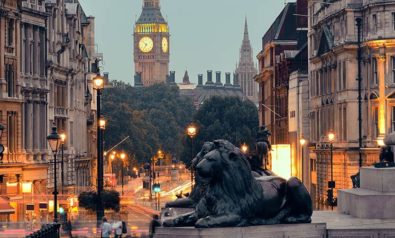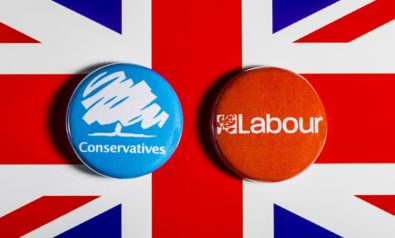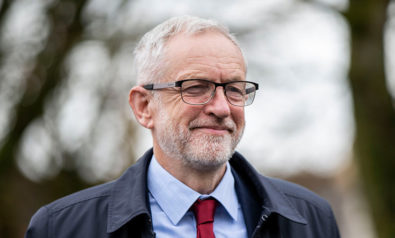The outcome of the election in the United Kingdom is just one more piece of evidence of a pernicious trend that has increasingly infested liberal democracies — extreme polarization. While it will take some time to get a complete picture of what happened, one thing is clear: The result of the election has revealed the existence of a gigantic chasm — a political Grand Canyon, as it were — between England and Scotland, on the essential issue that informed this election.
360˚ Insight: Can Anything Unite the United Kingdom?
Representative democracy, or so political theorists have told us, is all about making compromises. Even in majoritarian systems such as the UK, politics is not supposed to be a game of “winner takes all.” Reality is — as the result of the Brexit referendum made glaringly obvious — that today there are as many voters for as there are voters against on most important issues. Politics, as Max Weber famously put it, is “a strong and slow boring of hard boards,” hardly conducive to the likes of Donald Trump or, for that matter, Boris Johnson.
Yet today, that lesson seems to have fallen to the wayside. The contemporary political landscape is characterized by extreme polarization — and not only in Britain or the US.
Unreasonable People
In its most rudimentary form, extreme polarization means that even reasonable people have nothing to say to each other. Political polarization divides families and separates close relatives who, for instance during Thanksgiving dinner, desperately avoid mentioning politics — in line with the famous “Fawlty Towers” quip, “Don’t mention the war!” — in order to avoid that dinner ending in a fist fight. Knowing, for instance, that somebody voted for Trump, more often that not has meant the end of friendships and even communication among relatives.
A number of secular developments account for today’s polarization. Not all of them are grounded in politics. In fact, most of them are not. Yet — and this is the problem — they unfortunately find their expression and release most noticeably in politics. Brexit is but one, albeit prominent, example. There is no compromise between those who consider Britain’s exit from the EU the solution to everything that has gone wrong in the country and those, like the Scots, who consider Brexit a disaster.
The same holds true for Donald Trump. He might be somewhat unhinged, and he might be competing for the honor of being the worst president in recent American history (suddenly George W. Bush doesn’t look that bad any more). But for diehard Trumpistas — and they still exist, many of them evangelicals who lack any sense of irony — “The Donald” continues to be the man of providence, like Dan Ackroyd and John Belushi a on mission from God, to snatch America’s WASP-cum-WC (C stands for Catholicism) cultural supremacy from the clutches of secular, multicultural, “liberal” perversion.
It would be convenient to attribute extreme polarization to the nefarious influence of radical right-wing populism in Western democracies. To be sure, radical right-wing populist politicians such as Marine Le Pen, Matteo Salvini, Nigel Farage and Santiago Abascal (the strongman of Spain’s VOX) have made it their political business to stoke the fire of anger, fear and resentment. In reality, however, their appeal at the polls is but a reflection/expression of secular developments that fuel polarization. In order to understand what is happening today, it might be useful to take a brief trip down memory lane.
The Second Coming
In the 1890s, American populists came together and formed a political party, which at one point had the potential to seriously threaten the two major parties. This was a period in American history characterized by enormous turmoil — economic, social, cultural. Mark Twain called it the “Gilded Age,” a moniker which entered the pages of American historiography. The age, however, was only gilded for a small minority. For most Americans at the time, the reality looked quite different.
The populists “hit the nerve of the time” when, in their party manifesto, they charged that “The fruits of the toil of millions are boldly stolen to build up colossal fortunes for a few, unprecedented in the history of mankind; and the possessors of those, in turn, despise the republic and endanger liberty. From the same prolific womb of governmental injustice we breed the two great classes — tramps and millionaires.” The analysis was a tad exaggerated. But it reflected a reality: the inexorable advance of blatant inequality across American society.
What we are witnessing today is the second coming of the Gilded Age, not only in the United States, but also in Europe. Inequality has escalated, even in countries such as Sweden, once touted as the paragon of social equality and harmony. Even in Switzerland the times have changed, with Teslas replacing Maseratis and Ferraris as the latest status symbols of the rich and famous.
Income, and particularly wealth, inequality might be the most visible cause of polarization. Yet it is certainly not the most significant one. Much more significant are regional disparities, particularly the growing gap between metropolitan cities and rural areas. In the United States, according to a report by the McKinsey consulting firm, by 2030, 25 cities will account for a whopping 60% of job growth, while rural areas for little more than 1%. As an Economist report recently put it, growing “regional disparities are built into the mechanisms of globalisation” leading to the “marginalisation” of a growing number of regions and increased geographical polarization in advanced capitalist countries.
Most importantly, geographical concentration has resulted is what another McKinsey report has characterized as the emergence of “superstar cities” — urban conglomerates such as London, Paris, Munich, New York, Mumbai and Shenzhen. What they have in common is that they are hubs of global finance, business, technology and innovation. While the top 50 superstar cities account for only 8% of the global population, they account for 45% percent of headquarters of firms with more than $1 billion in annual revenue.
Payback Day
What metropolitan areas also share is a cosmopolitan outlook, an openness to the world. Here we have the second major cause of polarization — what sociologists have identified as a rapidly growing cosmopolitan/parochial cleavage. Cosmopolitans promote universal values, such as global human rights, multiculturalism and global/transborder solidarity. Against that, parochialists defend the integrity of local identity, cultural autonomy, (national) sovereignty and the “right to difference.”
Cosmopolitanism is the ethical outlook of a highly educated, highly mobile new middle class concentrated in big cities and university towns, such as London and Oxford. Hardly surprising, majorities in both cities voted against Brexit and, one would expect, against the Conservatives in yesterday’s election. Against that, “Johnson land” consists largely of what Andrés Rodríguez-Pose recently called “the places that don’t matter” — Britain’s equivalent to America’s “fly-over country.”
The outcome of the December 12 election was above all owed to the electoral backlash of the by now famous “Workington Man” — a symbol that stands for ordinary working-class voters, white, male, with little “cultural capital” and particularly hard hit by deindustrialization and globalization. Like their American counterparts who voted for Trump, they are desperate, without illusions and out for revenge. A couple of decades ago, Austrian political scientists coined to phrase “Wahltag ist Zahltag” — election day is payback day — in order to explain the dramatic gains of Jorg Haider’s Freedom Party in the 1990s. If there ever was a Zahltag, it was yesterday in Great Britain.
Cosmopolitanism and parochialism are not necessarily incompatible. Unfortunately, political entrepreneurs have generally found it easier to bank on one or the other rather than seeking a middle ground. The victim of this development has been the moderate center. The dismal showing by the Liberal Democrats in this election is paradigmatic. One of the central doctrines in political science used to be that elections are won in the center, a notion shattered by the election of Donald Trump.
Today, it seems elections are won on the margins, if only because in recent decades the margins have dramatically grown, particularly on the nativist right. On the margins, electoral choice is primarily driven by emotions: anxiety, anger and resentment, and by strong sentiments of revenge. Ironically, in these times, the vote is one of the few means for those who feel ignored and abandoned by the political establishment to express their rage. This explains Labour’s dramatic losses in once safe constituencies. In the age of extreme polarization, betrayal — real or imagined — is unforgivable.
The views expressed in this article are the author’s own and do not necessarily reflect Fair Observer’s editorial policy.
Support Fair Observer
We rely on your support for our independence, diversity and quality.
For more than 10 years, Fair Observer has been free, fair and independent. No billionaire owns us, no advertisers control us. We are a reader-supported nonprofit. Unlike many other publications, we keep our content free for readers regardless of where they live or whether they can afford to pay. We have no paywalls and no ads.
In the post-truth era of fake news, echo chambers and filter bubbles, we publish a plurality of perspectives from around the world. Anyone can publish with us, but everyone goes through a rigorous editorial process. So, you get fact-checked, well-reasoned content instead of noise.
We publish 2,500+ voices from 90+ countries. We also conduct education and training programs
on subjects ranging from digital media and journalism to writing and critical thinking. This
doesn’t come cheap. Servers, editors, trainers and web developers cost
money.
Please consider supporting us on a regular basis as a recurring donor or a
sustaining member.
Will you support FO’s journalism?
We rely on your support for our independence, diversity and quality.
















